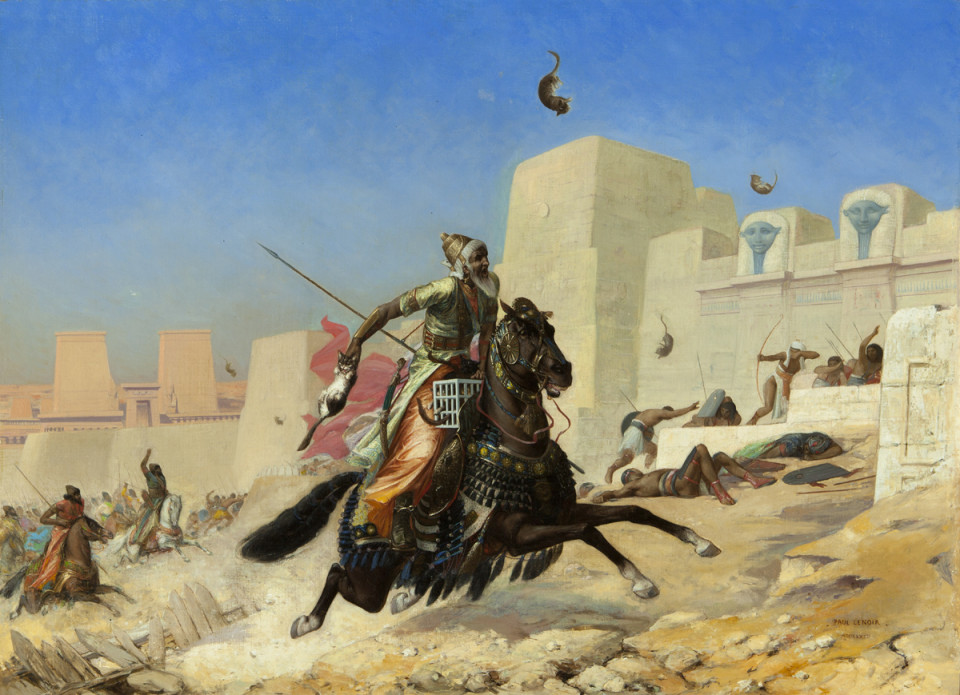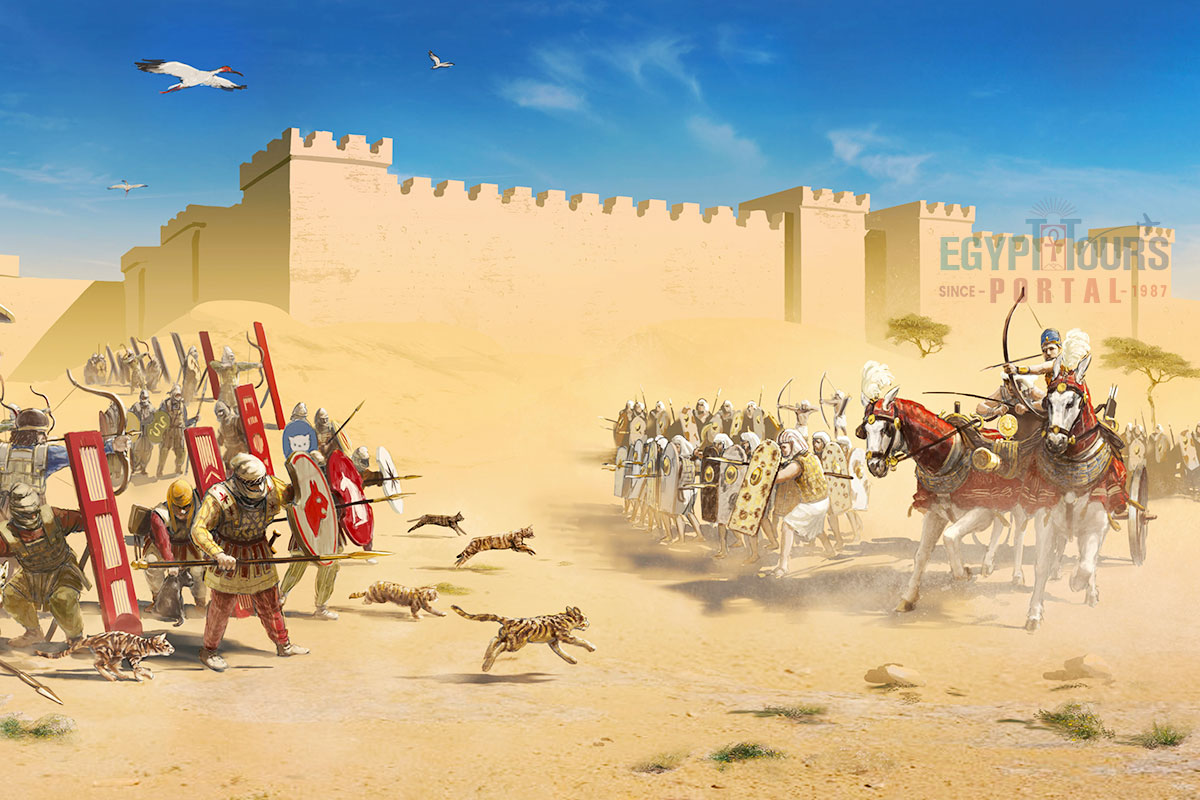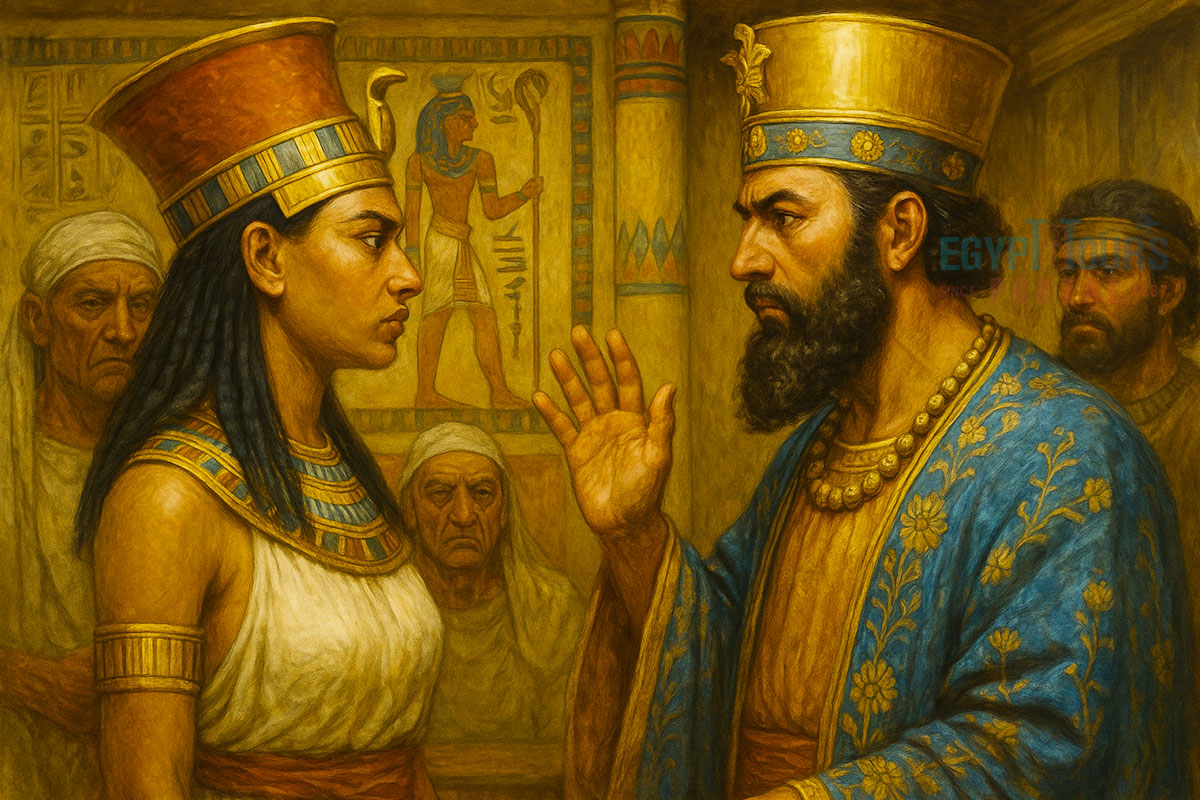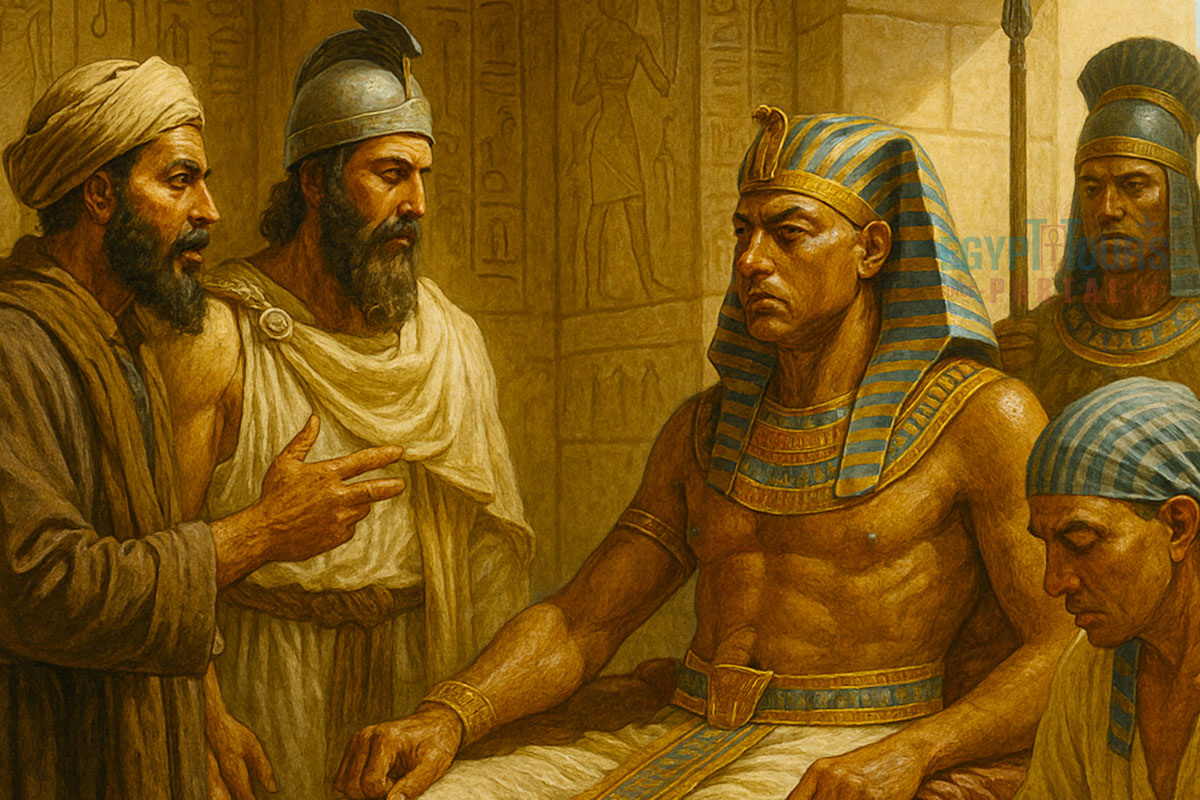- Local Time: 11:16 AM
- Weather: 26 ℃ / 79 ℉
The Wait Is Over – The GRAND EGYPTIAN MUSEUM Is Opening Its Doors! Be among the first to explore Egypt’s greatest treasure.
In 525 BCE, Persian king Cambyses II used an insult by Pharaoh Amasis II as a pretext to invade Egypt. Led by the defector Phanes of Halicarnassus and supported by Arabian allies, the Persians captured the frontier city of Pelusium by advancing behind cats sacred to the goddess Bastet, forcing Egyptian archers to hold their fire. Routed, Egypt’s army retreated to Memphis, where the new pharaoh Psametik III surrendered after a short siege and was later executed for revolt. Egypt became a Persian province (27th Dynasty); despite later uprisings, the defeat at Pelusium ended native rule and paved the way for successive Persian, Greek, and Roman domination.

The Battle of Pelusium in 525 BCE was a turning point that reshaped Egyptian history and marked the first time this ancient civilization fell to a foreign power. In a strategic and unexpected move, Persian King Cambyses II used the Egyptians’ reverence for sacred ancient Egyptian animals, especially cats, which are ancient Egyptian symbols of one of the most famous ancient Egyptian deities, the goddess Bastet, to his advantage, unnerving the Egyptian forces under Pharaoh Psametik III.
This clever tactic, which broke Egypt’s defenses, ushered in the 27th Dynasty under Persian rule and ended centuries of Egyptian independence. The battle’s impact was profound, setting Egypt on a new course where it would eventually come under the control of other empires, from Persia to Greece and finally Rome. In exploring the causes, strategies, and enduring legacy of this battle, we uncover a pivotal moment that forever altered Egypt’s place in the ancient world.

Throughout history, few battles have had as lasting an impact as the Battle of Pelusium in 525 BCE. This decisive conflict saw the Egyptian forces led by Pharaoh Psametik III (reigning briefly from 526–525 BCE) clash with the formidable Achaemenid forces of Cambyses II, king of the Persian Empire (525–522 BCE). Pelusium, a strategic city near the Delta of the nile river, became the theater for this critical engagement.
The battle marked the end of Egypt’s era as an independent, powerful kingdom, as the throne of the pharaohs passed to a foreign ruler for the first time. Egypt became a satrapy, or province, under Persian control, initiating a new chapter of Persian dominance over the region.
The war’s roots lay in a complex interplay of cultural values, political alliances, and a highly personal grievance. A key factor was the diplomacy, or lack thereof, of Pharaoh Amasis II, the father of Psametik III. Although Amasis had navigated international relations and alliances effectively for much of his reign, his interactions with the powerful Persian king created lasting hostility.
Cambyses II’s decision to invade Egypt was not purely a political move; it was spurred by personal offense and a vow to avenge an insult he felt had directly targeted him. This motivation shaped his strategy and fueled his determination to conquer Egypt.
What made Cambyses’s victory even more notable was his remarkable understanding and manipulation of Egyptian culture. Cambyses employed a strategic innovation that remains infamous: leveraging Egypt’s religious reverence for animals, particularly cats, which were sacred due to their association with Bastet, the goddess of home, fertility, and protection.
His forces displayed the goddess’s symbol on their shields and even deployed cats and other animals sacred to Egyptians at the front lines, knowing Egyptian soldiers would hesitate to harm these symbols of divine protection. This unexpected psychological tactic played a significant role in demoralizing the Egyptian soldiers and neutralizing their resistance, paving the way for a swift Persian victory.

The primary cause of the Battle of Pelusium was a diplomatic incident stemming from a marriage proposal. Cambyses II, intent on consolidating power and possibly seeking peaceful relations, requested the hand of Amasis II’s daughter, a marriage that would have forged a strong alliance between Egypt and Persia.
However, Amasis, unwilling to send his daughter to marry a foreign king he regarded as inferior to the Egyptian monarchy, chose deceit over diplomacy. To satisfy Cambyses without compromising his values, Amasis sent a young woman named Nitetis, the daughter of his predecessor, Pharaoh Apries, to Persia in place of his daughter.
Nitetis, upon her arrival in Persia, exposed the deception to Cambyses II, revealing that Amasis had tricked him by sending an impostor. This revelation led Cambyses to feel personally and deeply insulted, viewing Amasis’s actions as a severe affront not only to his honor but to Persia’s standing as an empire.
Cambyses vowed to retaliate and conquer Egypt to avenge this act of treachery, which he interpreted as a sign of disrespect toward his empire. This personal insult ignited Cambyses’s determination to invade and subdue Egypt, sparking a war that would end centuries of Egyptian independence.
Beyond the personal vendetta, Cambyses’s desire to annex Egypt was also driven by strategic and economic incentives. Egypt was known for its wealth, abundant resources, and strategic position along vital trade routes.
By controlling Egypt, Cambyses would gain access to the riches of the Nile Valley, strengthen Persia’s regional dominance, and secure a key route to both the Mediterranean and African regions. With Egypt weakened by internal divisions and lacking the unity it once boasted, the timing was ideal for Cambyses to extend his empire’s reach into the Nile Delta.
Thus, while Cambyses’s grievance catalyzed his resolve, the Persian king’s invasion of Egypt was equally motivated by political strategy and economic ambition. This combination of personal offense and imperial aspirations set the stage for the Battle of Pelusium, a confrontation that would reshape Egypt’s history and place it under foreign rule for the first time in its long and storied past.

The bitterness of Amasia II towards "Phanes of Halicarnassus"a wise councilman, mercenary and tactician and one of the most respected and revered men in the military and royal community of Egypt for an unknown reason, led "Phanes" to become his worst enemy as he escaped to Persia and assisted the Persian king’s army in their conquest in all manners of strategy and tactics and was the true mastermind in the defeat of Egypt, which he told him about the Egyptian religions in this time and King Cambyses used this important information in the war to defeat the Egyptians.
Amasia II had a bad habit of gaining enemies and forming a bad relationship with his neighbors, like the king of Arabia, who granted safe passage to the Cambyses' army and supplied him with troops, which facilitated the entire destruction of the Egyptian empire.
Amasis died six months before Cambyses reached Egypt which left his son "Psamtik" who hoped to save his country, entirely dependent on his army and his limited military experience as all of Egypt’s allies like the Greek forces, the grand fleet of Polycrates of Samos and Egypt’s most prominent tactical advisor phanes of Halicarnassus, switched to the other side of the Persian.

The battle of Pelusium was extremely special because it was an early form of Psychological warfare, as told by Herodotus (a Greek historian). The Persians had a genius tactic to use the Egyptians' religious belief against them, The Persians put cats in front of them as they attacked. The Egyptians didn’t dare to shoot an arrow or even attack in any form, so they wouldn’t hurt the cats.
This strategy was based on the idea that ancient Egyptian worshiped the goddess Bastet (the cat goddess of beauty, protection, the home, fertility), during this period, Bastet was the most powerful and honored goddess in Egypt, and because of that casts were protect and highly respected as the punishment for killing a cat was the death sentence and absolute damnation in the afterlife and that’s why the Egyptian lost the city of Pelusium.
The Egyptians lost fifty thousand men while the Persians only lost seven thousand men, and then the Egyptians retreated to the city of Memphis. Cambyses took his troops to Memphis and was able to defeat the remaining army, which made Psamtik surrender the city and live under the watch of the Persian emperor, but he was later executed when he attempted a revolt against the Persian Empire.
Discover the incredible religion of the ancient Egyptians that defined their rise and fall
Read More
After the Battle of Pelusium, Egypt lost its independence and fell under Persian control, beginning the 27th Dynasty (First Persian Period) from 525 to 404 BCE, where Egypt functioned as a Persian province with Cambyses II initially adapting to Egyptian customs to stabilize his rule. Despite these efforts, Egyptians resisted foreign rule, sparking revolts, including a successful uprising by Pharaoh Amyrtaeus in 404 BCE that briefly restored autonomy.
Persia reconquered Egypt in 343 BCE, establishing the 31st Dynasty (Second Persian Period) marked by stricter governance, but Egyptian resistance persisted until Alexander the Great’s conquest in 332 BCE, which ended Persian rule permanently. Alexander was welcomed as a liberator, and after his death, Egypt thrived under the Greek Ptolemaic Dynasty, known for cultural achievements like the Library of Alexandria and the Lighthouse of Alexandria.
Finally, in 30 BCE, Egypt was annexed by Rome after Cleopatra VII’s defeat, transforming it into a vital Roman province. Despite centuries of foreign rule, Egypt’s rich cultural identity endured, influencing successive empires.
Egypt "The Cradle of Human Civilization" is known for its ancient history, culture, mythology, so you can make the dream true by casting your eyes on the ancient Egyptian temples and ancient Egyptian tombs in Cairo, Luxor, Aswan, and all of Egypt destinations through our magical Egypt tour, we have well organized unforgettable Nile cruises to enjoy the best trips to Egypt.
Private 4 Days Cairo Tour Packages for Indian Travelers 4 days Cairo Egypt Tour pack...
Tour Location: Cairo – Giza...
5 Days Cairo and Alexandria Tour Package For Indian Travelers 5 days Cairo and Alexa...
Tour Location: Cairo/Giza/Alexandria...
6 Days Cairo, Luxor & Aswan Tour Package For Indian Travelers 6 days Cairo, Luxo...
Tour Location: Cairo/Giza/Aswan/Luxor...
Amazing 7 Days Cairo and Hurghada Holiday for Indian Travelers 7 Days Cairo & Hu...
Tour Location: Cairo – Giza – Hurgh...
The entire country of Egypt deserve to be explored with its every heavenly detail but there are places that must be seen before any other such as the breathtaking Hurghada's red sea, The wonders of Cairo the pyramids of Giza, the great sphinx, the Egyptian Museum, Khan El Khalili Bazaar, the wonders of Luxor like Valley of the Kings, Karnak & Hatshepsut temple and the wonders of Aswan such as Abu Simbel temples, Philea temple, Unfinished obelisk and The Wonders of Alexandria like Qaitbat Citadel, Pompey's Pillar and Alexandria Library. Read more about the best places to visit in Egypt.
If you want to apply for a Visa On Arrival that lasts for 30 days then you should be one of the eligible countries, have a valid passport with at least 6 months remaining and pay 25$ USD in cash, as for the E-Visa for 30 day you should have a valid passport for at least 8 months, complete the online application, pay the e-visa fee then print the e-visa to later be presented to the airport border guard. You could also be one of the lucky ones who can obtain a free visa for 90 days. Read more about Egypt travel visa.
Egypt has a variety of delicious cuisines but we recommend “Ful & Ta’meya (Fava Beans and Falafel)”, Mulukhiya, “Koshary”, a traditional Egyptian pasta dish, and Kebab & Kofta, the Egyptian traditional meat dish.
The best time to travel to Egypt is during the winter from September to April as the climate becomes a little tropical accompanied by a magical atmosphere of warm weather with a winter breeze. You will be notified in the week of your trip if the Climate is unsafe and if any changes have been made.
You should pack everything you could ever need in a small bag so you could move easily between your destinations.
We have been creating the finest vacations for more than 20 years around the most majestic destinations in Egypt. Our staff consists of the best operators, guides and drivers who dedicate all of their time & effort to make you have the perfect vacation. All of our tours are customized by Travel, Financial & Time consultants to fit your every possible need during your vacation. It doesn't go without saying that your safety and comfort are our main priority and all of our resources will be directed to provide the finest atmosphere until you return home.
You will feel safe in Egypt as the current atmosphere of the country is quite peaceful after the government took powerful measures like restructuring the entire tourist police to include all the important and tourist attractions in Egypt. Read more about is it safe to travel to Egypt.
Wear whatever feels right and comfortable. It is advised to wear something light and comfortable footwear like a closed-toe shoe to sustain the terrain of Egypt. Put on sun block during your time in Egypt in the summer to protect yourself from the sun.
The best activity is by far boarding a Nile Cruise between Luxor and Aswan or Vise Versa. Witness the beauty of Egypt from a hot balloon or a plane and try all the delicious Egyptian cuisines and drinks plus shopping in old Cairo. Explore the allure and wonders of the red sea in the magical city resorts of Egypt like Hurghada and many more by diving and snorkeling in the marine life or Hurghada. Behold the mesmerizing western desert by a safari trip under the heavenly Egyptian skies.
There are a lot of public holidays in Egypt too many to count either religious or nation, the most important festivals are the holy month of Ramadan which ends with Eid Al Fitr, Christmas and new years eve. Read more about festivals & publich holidays in Egypt.
Egypt is considered to be one of the most liberal Islamic countries but it has become a little bit conservative in the last couple of decades so it is advised to avoid showing your chest, shoulders or legs below the knees.
Arabic is the official language and Most Egyptians, who live in the cities, speak or understand English or at least some English words or phrases. Fewer Egyptians can speak French, Italian, Spanish, and German. Professional tour guides, who work in the tourism sector, are equipped to handle visitors who cannot speak Arabic and they will speak enough English and other languages to fulfill the needs of all our clients.
The fastest way is a car, of course, a taxi. If you are in Cairo ride a white taxi to move faster or you could board the fastest way of transportation in Egypt metro if the roads are in rush hour.
The temperature in Egypt ranges from 37c to 14 c. Summer in Egypt is somehow hot but sometimes it becomes cold at night and winter is cool and mild. The average of low temperatures vary from 9.5 °C in the wintertime to 23 °C in the summertime and the average high temperatures vary from 17 °C in the wintertime to 32 °C in the summertime. The temperature is moderate all along the coasts.
It is the home of everything a traveler might be looking for from amazing historical sites dating to more than 4000 years to enchanting city resorts & beaches. You will live the vacation you deserve as Egypt has everything you could possibly imagine.









